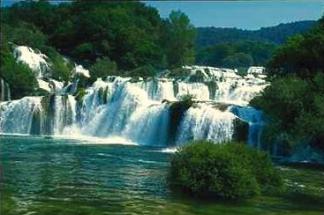Average Annual Rainfall in Inches: Rain is the source of renewable fresh water. Rain is absolutely necessary for human life, farm livestock, wild animals, farm produce, and timber production.
Year 2009 Dollar Revenue per Acre of Farmland: This is important because it shows the average agricultural value of all the farmland in each state, assuming the land is used in its most efficient manner by the owners of that land.
Average Number of Frost Free Days per Year: This directly impacts the number of crops that can be harvested per year. Some areas will allow two crops to be grown each year whereas other areas will only have enough warm weather to grow one crop. If there aren't enough frost free days this also limits the types of crops that can be grown in a region. Finally, if there are more frost free days then the winters will be shorter which means a family would need less firewood to survive the cold weather months.
Data of Fourteen Random States Across the United States
State | Annual
Rainfall | Revenue / Acre
of Farmland | Average Frost Free
Days per Year |
| Alaska | 53.15 inches | $ 45 | 60 days |
| Arizona | 7.11 inches | $ 135 | 150 days |
| Colorado | 15.31 inches | $ 210 | 90 days |
| Georgia | 48.61 inches | $ 802 | 210 days |
| Kansas | 28.61 inches | $ 299 | 180 days |
| Illinois | 33.34 inches | $ 608 | 150 days |
| Minnesota | 26.36 inches | $ 571 | 120 days |
| Montana | 11.37 inches | $ 54 | 120 days |
| New York | 39.28 inches | $ 577 | 120 days |
| Oklahoma | 30.89 inches | $ 168 | 210 days |
| Tennessee | 48.49 inches | $ 355 | 180 days |
| Texas | 34.70 inches | $ 156 | 210 days |
| Virginia | 45.22 inches | $ 434 | 180 days |
| Washington | 27.66 inches | $ 503 | 150 days |
- - - Data Sources - - -
The above annual rainfall data is from: http://www.betweenwaters.com/etc/usrain.html
The above average frost free days data is from: http://www.ncdc.noaa.gov/oa/climate/freezefrost/frostfreemaps.html
The above farmland data is from: http://www.ers.usda.gov/statefacts/us.htm
The above web site contains information for the entire United States of America.
To view the data on one specific state change the ending "us.htm" to the state abbreviation, such as "va.htm" for Virginia or "tx.htm" for Texas.
The revenue per acre column was found by dividing the year 2009 total "final agricultural sector output" (including livestock and lumber) by the total amount of cropland and pastureland and woodland in production.
- - - - - - - - - - - - - -
On the average, in the entire United States of America the average revenue was $ 359 per acre during the year 2009. Some states did better than this and some states did worse.
On the average, all the states west of the Mississippi River receive an average of 24.3 inches of rain per year.
On the average, all the states east of the Mississippi River receive an average of 42.4 inches of rain per year.
Is average rainfall important to you today? The answer would depend on whether or not you were trying to grow crops, or manage livestock, or if you relied on a water well for your water.
Will average rainfall be important to you in the future during a serious long-term hard times tragedy event? Use common sense to answer this question yourself.
The above table data is the average statistic for an entire state. No one should make a decision based on the average data for an entire state because this would not be using good common sense. Good common sense would tell you that every state has a significant variation in all the above statistics from the west side of the state to the east side of the state, and from the north side of the state to the south side of the state. Any move decision should be based on the average statistics for the exact county within the state you are considering because each county will have either higher or lower statistics than the above state averages. This is because an average converts the high and low values into a composite average.
I am also not suggesting that you use the above criteria to select a state to move to. There are many other issues that are also important. The above factors are just three of the issues you should consider in choosing a new location if you are seriously considering a move.
There are a wide variety of other issues you should also consider. For example, do you currently have an extensive network of family members and relatives who live in close proximity to you, and do they have a life history of being hard working ethical individuals? If you have this type of supportive family, then a decision to separate yourself from your extended family may not be a very smart thing to do. If you move to a new area then you will be the "outsider" or "immigrant" and you may be treated as one if a serious hard times tragedy event unfolds rather suddenly.
The purpose of this article was not to list all the different issues you would need to think about before making a move. The purpose of this article was to caution you against making an important move decision based on a limited number of statistics and ignoring a wide variety of other statistics that may be of equal or greater significance to your decision. If you will pause and use common sense then you can easily think of many of these other important variables yourself.
In closing, please allow me let to ask one final question. Who do you depend on the most?
- Do you depend on yourself first and God second?
- Do you depend on God first and yourself second?
If you were to use common sense, which of the above two choices do you think would be the best choice for survival during a serious hard times tragedy event?
Respectfully,
Grandpappy.
Grandpappy's e-mail address is: RobertWayneAtkins@hotmail.com


| 

































 As an example, where would you prefer to live during a serious long-term hard times tragedy event?
As an example, where would you prefer to live during a serious long-term hard times tragedy event? Now let's compare a few different states across the United States based on:
Now let's compare a few different states across the United States based on:
